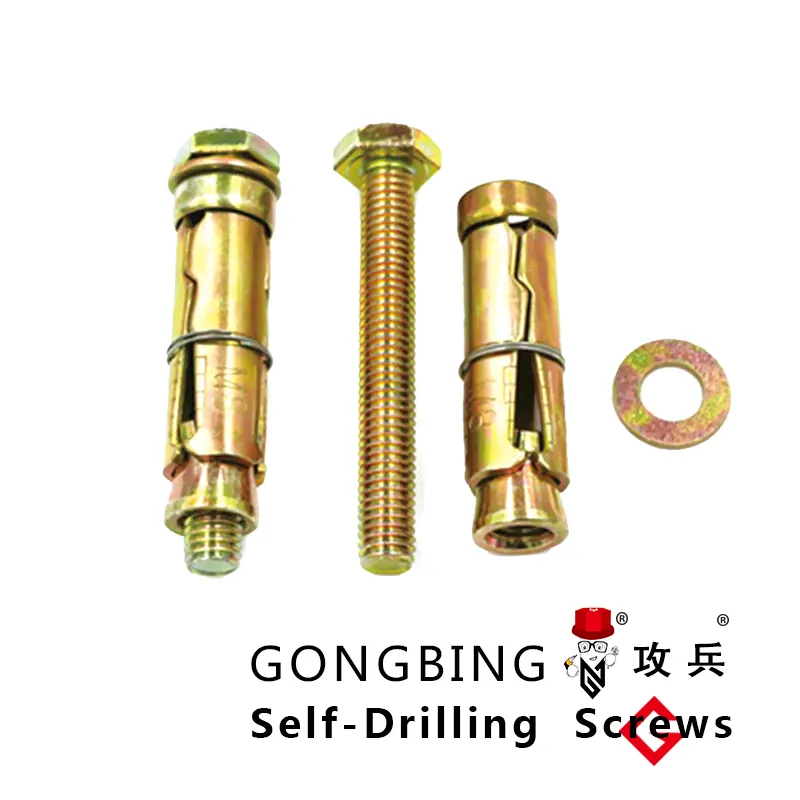Strong Anchors, Strong Structures
When it comes to building strength and stability, concrete expansion anchor systems are the hidden champions in today’s construction world. Whether you're working on commercial towers, parking garages, or highway bridges, these anchors secure critical connections between steel and concrete. Contractors rely on them for reliable load-bearing performance, especially when dealing with tension and shear forces. From fixing base plates to embedding heavy machinery, concrete expansion anchor technology allows builders to work faster and with greater confidence. As cities grow vertically and infrastructure demands rise, their role becomes even more crucial in modern engineering projects.
Heavy Duty Expansion Anchor Solutions For Industrial Projects
In industrial environments where high strength is non-negotiable, heavy duty expansion anchor choices provide unmatched holding power. These anchors are designed to handle extreme weight loads and constant stress, making them ideal for warehouses, refineries, and manufacturing plants. When traditional fasteners fall short, heavy duty expansion anchor options are the go-to for structural reinforcements. They secure HVAC units, cable trays, and large equipment, maintaining safety even under heavy vibrations and load shifts. As industries become more automated and equipment grows in size, the need for strong anchoring points becomes even more apparent.
Expansion Bolts For Structural Steel Connections In Buildings
For steel frameworks that must stand up to the test of time and weather, expansion bolts for structural steel are vital components in modern architecture. Skyscrapers, stadiums, and even airport terminals benefit from the rigid grip these fasteners offer. With the ability to distribute load evenly and resist loosening over time, expansion bolts for structural steel ensure joints remain secure under dynamic stress. Their application in steel-to-concrete connections allows for a seamless blend of materials, ensuring the frame of the building is rock-solid from the ground up. This type of bolt is indispensable when it comes to constructing earthquake-resistant buildings and long-span structures.
Choosing The Right Concrete Expansion Anchor For Outdoor Projects
Outdoor construction presents unique challenges, from temperature swings to moisture exposure, making concrete expansion anchor selection a critical decision. For fencing, lighting poles, and outdoor signage, choosing the correct type of concrete expansion anchor can determine whether a structure stays firm or begins to shift. Builders now favor corrosion-resistant finishes and environmentally tested designs that can withstand both UV rays and harsh winters. These anchors are tested in salt sprays and pressure simulations to ensure long-term durability. In today’s eco-conscious world, sustainable outdoor installations require components that last longer and perform stronger.
Heavy Duty Expansion Anchor For Safety-Critical Installations
In life-saving applications like hospitals, emergency staircases, and fire escape routes, heavy duty expansion anchor systems support essential structures. These applications demand not only strength but fail-proof reliability under emergency loads. Installation teams trust heavy duty expansion anchor designs for securing structural steel supports, load-bearing walls, and mechanical systems critical to safe evacuation. The enhanced torque retention and high tensile capacity ensure safety measures hold up during disaster scenarios. Every year, building codes tighten around emergency infrastructure, pushing contractors to opt for the most reliable anchors on the market.

Expansion Bolts For Structural Steel FAQs
What are expansion bolts for structural steel used for?
Expansion bolts for structural steel are used to connect steel components to concrete or masonry. They provide strong, secure fastenings for beams, brackets, base plates, and other structural elements in large buildings, bridges, and towers.
Can expansion bolts be reused once removed?
No, expansion bolts are designed for single-use. Once they are tightened, the expansion mechanism deforms the sleeve permanently. Reusing them can compromise their holding strength and safety.
How do I choose the right size of expansion bolt for structural steel?
Choose the bolt size based on the weight it needs to support, the concrete thickness, and the structural requirements of your project. Always refer to engineering guidelines or consult with a structural engineer for load calculations.
Are these bolts resistant to corrosion in outdoor settings?
Yes, most expansion bolts for structural steel come with galvanized or stainless steel coatings, making them suitable for outdoor environments and resistant to rust, water damage, and temperature changes.
What's the difference between mechanical and chemical anchors for steel structures?
Mechanical anchors like expansion bolts for structural steel expand physically in the hole, offering immediate load-bearing capacity. Chemical anchors use resin to bond steel to concrete, ideal for high-load or close-edge conditions, but they require curing time.
-
Weatherproof Plastic Expansion Anchors for OutdoorВестиJun.06,2025
-
Sustainability in the Supply Chain: Eco-Friendly TEK Screws ProductionВестиJun.06,2025
-
Load-Bearing Capacity of External Insulation FixingsВестиJun.06,2025
-
Double Head Bolts: Enhancing Efficiency in Industrial MachineryВестиJun.06,2025
-
Corrosion Resistance in Chipboard Screws: Coatings for Wholesale DurabilityВестиJun.06,2025
-
Butterfly Toggle Bolts : Enhancing Structural ResilienceВестиJun.06,2025
